高考专区 二轮专题 重难语法课(3)——情态动词 课件(28张)
文档属性
| 名称 | 高考专区 二轮专题 重难语法课(3)——情态动词 课件(28张) | 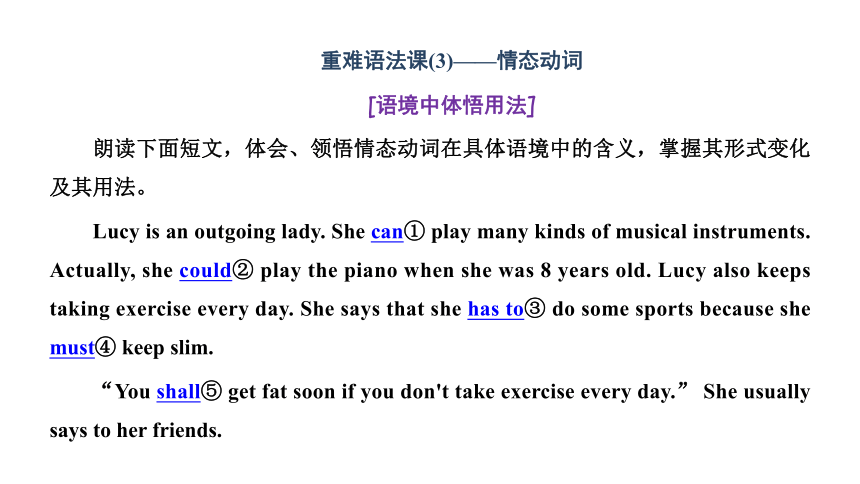 | |
| 格式 | zip | ||
| 文件大小 | 272.9KB | ||
| 资源类型 | 教案 | ||
| 版本资源 | 外研版 | ||
| 科目 | 英语 | ||
| 更新时间 | 2023-03-31 11:55:00 | ||
图片预览

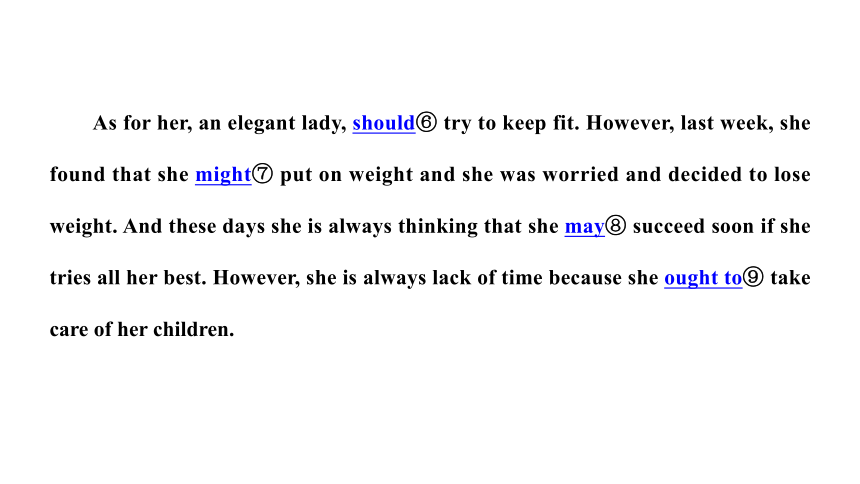
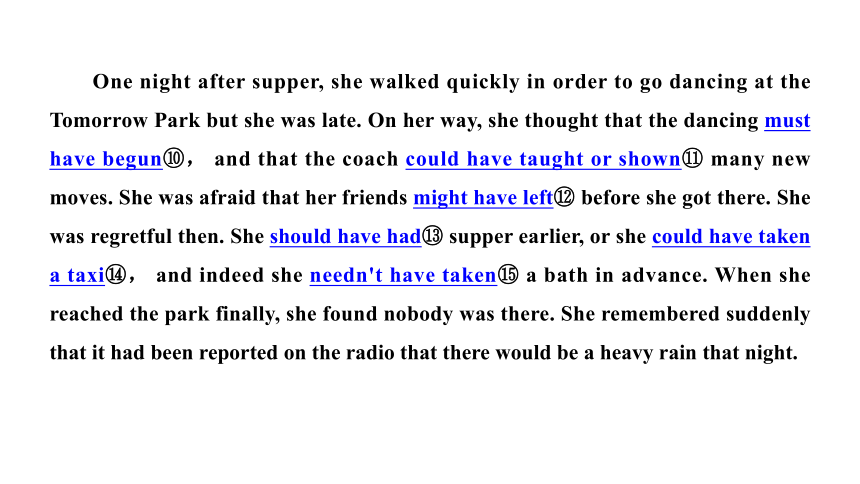
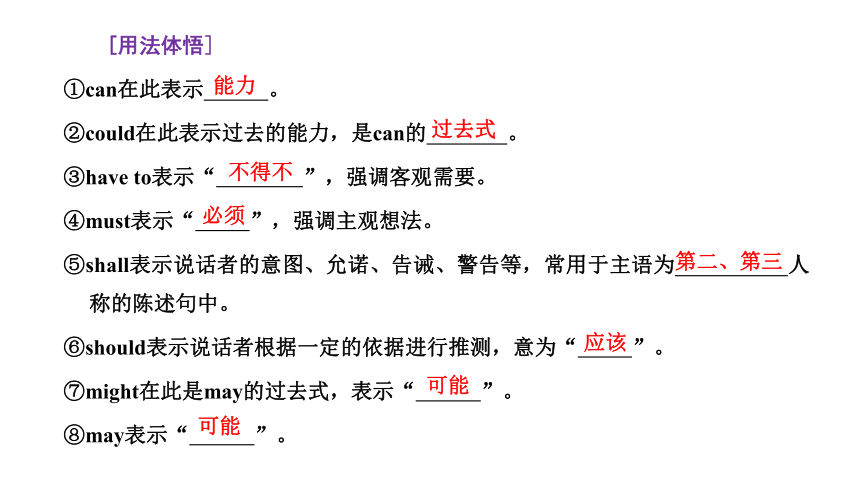
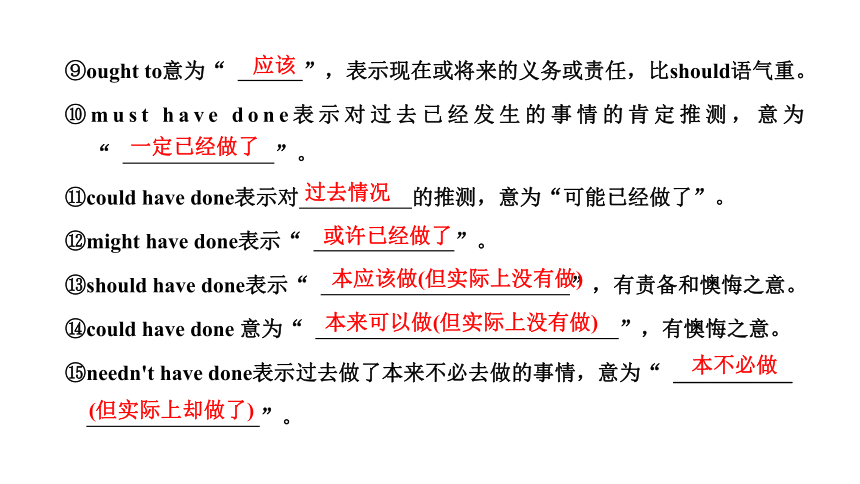

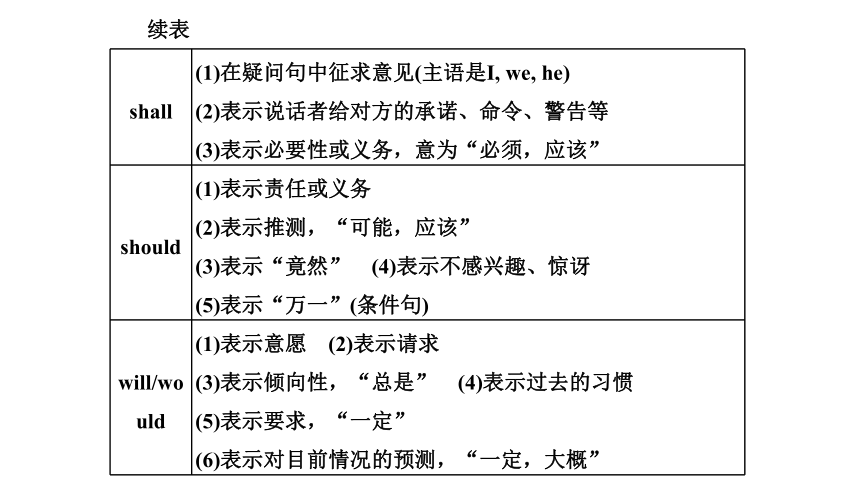
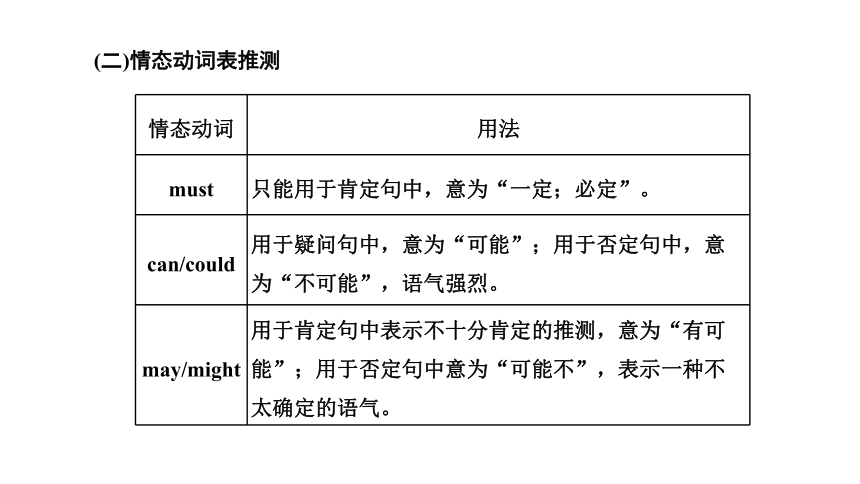
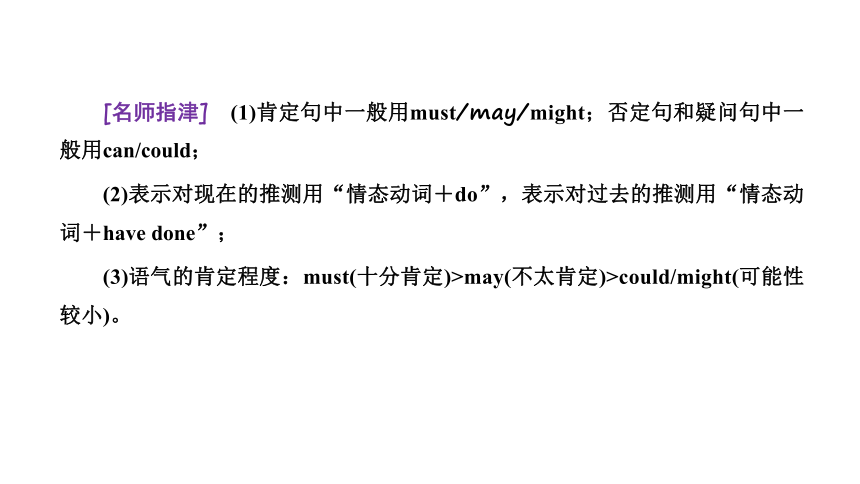
文档简介
(共28张PPT)
重难语法课(3)——情态动词
[语境中体悟用法]
朗读下面短文,体会、领悟情态动词在具体语境中的含义,掌握其形式变化及其用法。
Lucy is an outgoing lady. She can① play many kinds of musical instruments. Actually, she could② play the piano when she was 8 years old. Lucy also keeps taking exercise every day. She says that she has to③ do some sports because she must④ keep slim.
“You shall⑤ get fat soon if you don't take exercise every day.” She usually says to her friends.
As for her, an elegant lady, should⑥ try to keep fit. However, last week, she found that she might⑦ put on weight and she was worried and decided to lose weight. And these days she is always thinking that she may⑧ succeed soon if she tries all her best. However, she is always lack of time because she ought to⑨ take care of her children.
One night after supper, she walked quickly in order to go dancing at the Tomorrow Park but she was late. On her way, she thought that the dancing must have begun⑩, and that the coach could have taught or shown many new moves. She was afraid that her friends might have left before she got there. She was regretful then. She should have had supper earlier, or she could have taken a taxi , and indeed she needn't have taken a bath in advance. When she reached the park finally, she found nobody was there. She remembered suddenly that it had been reported on the radio that there would be a heavy rain that night.
[用法体悟]
①can在此表示 。
②could在此表示过去的能力,是can的 。
③have to表示“ ”,强调客观需要。
④must表示“ ”,强调主观想法。
⑤shall表示说话者的意图、允诺、告诫、警告等,常用于主语为 人称的陈述句中。
⑥should表示说话者根据一定的依据进行推测,意为“ ”。
⑦might在此是may的过去式,表示“ ”。
⑧may表示“ ”。
能力
过去式
不得不
必须
第二、第三
应该
可能
可能
⑨ought to意为“ ”,表示现在或将来的义务或责任,比should语气重。
⑩must have done表示对过去已经发生的事情的肯定推测,意为“ ”。
could have done表示对 的推测,意为“可能已经做了”。
might have done表示“ ”。
should have done表示“ ”,有责备和懊悔之意。
could have done 意为“ ”,有懊悔之意。
needn't have done表示过去做了本来不必去做的事情,意为“ ___________
”。
应该
一定已经做了
过去情况
或许已经做了
本应该做(但实际上没有做)
本来可以做(但实际上没有做)
本不必做
(但实际上却做了)
[系统中整合规则]
(一)情态动词的基本用法
can/could (1)表示能力,“能,会”
(2)表示请求,“能,可以”
(3)表示允许,“能,可以”
(4)表示提建议,“可以”
(5)表示可能性,可能(疑问句或否定句)
may/might (1)表示允许 (2)表示可能性 (3)表示祝愿
must (1)表示必要性,“必须”
(2)表示坚持,“偏要,非要”
(3)表示不可避免,“必定会”
(4)表示推测,“一定,准是”
shall (1)在疑问句中征求意见(主语是I, we, he)
(2)表示说话者给对方的承诺、命令、警告等
(3)表示必要性或义务,意为“必须,应该”
should (1)表示责任或义务
(2)表示推测,“可能,应该”
(3)表示“竟然” (4)表示不感兴趣、惊讶
(5)表示“万一”(条件句)
will/would (1)表示意愿 (2)表示请求
(3)表示倾向性,“总是” (4)表示过去的习惯
(5)表示要求,“一定”
(6)表示对目前情况的预测,“一定,大概”
续表
(二)情态动词表推测
情态动词 用法
must 只能用于肯定句中,意为“一定;必定”。
can/could 用于疑问句中,意为“可能”;用于否定句中,意为“不可能”,语气强烈。
may/might 用于肯定句中表示不十分肯定的推测,意为“有可能”;用于否定句中意为“可能不”,表示一种不太确定的语气。
[名师指津] (1)肯定句中一般用must/may/might;否定句和疑问句中一般用can/could;
(2)表示对现在的推测用“情态动词+do”,表示对过去的推测用“情态动词+have done”;
(3)语气的肯定程度:must(十分肯定)>may(不太肯定)>could/might(可能性较小)。
(三)“情态动词+have done” 的含义和用法
情态动词+have done 含义和用法
must have done 过去一定做过……(肯定句)
can/could have done 过去不可能做过……(否定句)
过去可能做过……吗?(疑问句)
could have done 本来能够做但实际上却未做(肯定句)
may/might have done 过去可能做过……(肯定句)
过去可能没有做过……(否定句)
should/ought to have done 本来应该做但是实际上未做……(肯定句)
本来不应该做而实际上做了……(否定句)
needn't have done 没必要做而实际上做了……
[集训中明晰考点]
考点1 情态动词的基本用法
1. (2021·新高考Ⅰ卷改编)Under this Act, all waterfowl hunters 16 years of age and over annually purchase and carry a Federal Duck Stamp.
解析:must 根据this Act可知本句是在说“法案”的要求,故填must 表示“必须”。
2. (2020·天津7月高考改编)Jim says we stay in his house as long as we leave it clean and tidy.
解析:can 句意:吉姆说只要我们保持房子干净整洁,我们就可以暂住在他的房子里。can在句中表示允许、许可,意为“可以”。
3. (2018·全国卷Ⅱ改编)As a kid, I loved to watch cartoons, but no matter how many times I asked to watch them, my parents not let me.
解析:would 表示过去的习惯,应用would。
4.(2021·新高考Ⅰ卷改编)We prefer to describe emotional intelligence as a specific set of skills that can (use) for either good or bad purposes.
解析:be used 情态动词后面用动词原形,动词use与句子主语之间构成被动关系,故用be used。
5. (2021·浙江6月高考改编)Nielsen always felt he should (do) comedy but his good looks and distinguished voice kept him busy in dramatic roles.
解析:be doing 情态动词后面用动词原形,根据语境可知“Nielsen 总感觉他应该正在做……”,故答案为 be doing。
考点2 情态动词的推测用法
1. (2021·浙江6月高考改编)My dad's words made me realize that my earnings
not be mine to do with as I wished.
解析:might/may 根据语境可知此空和后面的not表示“可能不”,故答案为 may 或might。
2. (2018·北京高考改编)In today's information age, the loss of data ________ cause serious problems for a company.
解析:can/may 句意:在当今的信息时代,数据的丢失可能会给一个公司带来严重的问题。根据句意可知,设空处表示一种可能性。故填can/may。
3. (2022·南通模拟)You be Carol.You haven't changed a bit after all these years.
解析:must 句意:你一定是卡萝尔。这么多年后你一点儿都没变。根据语境可知,此处应该用情态动词表示推测,由下文“这么多年后你一点儿都没变”可推知此处为非常肯定的猜测。故填must,意为“一定”。
4. (2022·济南模拟)People are recycling many things which they ________ (throw) away in the past.
解析:would/could/might have thrown 句意:人们正在回收利用很多他们过去可能会扔掉的东西。根据句意可知.从句是说过去可能会做的事。故填would/could/might have thrown。
考点3 “情态动词+have done”结构
1. (2020·天津5月高考)You have scolded him for his poor performance.After all, he had done his best.
解析:shouldn't 句意:你本不应该因为他表现不佳而责骂他。毕竟,他已经尽力了。shouldn't have done sth.“本不应该做某事”,符合语境。
2. (2022·海淀模拟)If we had paid enough attention to the issue of the heavily-overloaded vehicles, the tragedy of the collapse of an overpass in Wuxi (avoid).
解析:could have been avoided 句意:如果我们对超载车辆问题给予足够重视的话,就可以避免无锡立交桥垮塌的悲剧。本句为“情态动词+have done”结构,结合句意表示“本来可以;本来能够”应用could have done结构,且主语与谓语动词avoid构成被动关系,故应用could have been done形式。
3. (2022·天津模拟)I have one regret about the time I spent in high school: I
(take) more advanced classes that are really helpful in college.
解析:should have taken 句意:我对我的高中时代有一个遗憾:我本应该学一些在大学里很有帮助的高级课程。根据“I have one regret”可知,此处表示“本应该做而没有做”,所以用should have taken。
4. (2022·郑州模拟)It turned out that the hotel was so near.I (take) the taxi.
解析:needn't have taken 句意:结果证明这家宾馆非常近。我本不必乘坐出租车。needn't have done表示“本不必做某事而实际上做了”。故用needn't have taken。
[自测中查漏补缺]
Ⅰ.用适当的情态动词填空
1. (2022·天津模拟)There is no light in Smith's room.Therefore, he be at home.
2. you keep up a good state of mind every day.
3.If you smoke, do it outside, please.
4. I have a word with you It won't take long.
5.When he was young, he go swimming in the river lying south of his village.
can't
May
must
Can/May/Shall
would
6.You buy the TV guide for next week.I have already bought a copy.
7.Some women have made a good salary in a job instead of staying at home, but they decided not to work for the sake of the family.
8.You have the book as soon as I finish reading it.
9.He be sleeping in the room.We'd better not disturb him.
10.This old man is strange.He sit for hours without saying a word.
needn't
could
shall
might/may
will
1.crazily 考查副词。修饰动词shake,应用副词形式crazily。
2.listed 考查非谓语动词。分析句子结构可知,本句主语是This traditional lion dance,谓语是dates,非谓语动词list和主语This traditional lion dance之间是动宾关系,故用其过去分词listed作后置定语。
3.best 考查副词最高级。one of the+最高级(+名词复数)“最……之一”是英语习惯用法,故填well的最高级形式best。
4.be performed 考查情态动词和动词的语态。分析句子结构可知,空格处为谓语,动词perform和主语this challenging art之间是被动关系,应用被动语态,因有情态动词can,故填be performed。
5.bravery 考查名词。根据空格前的caution and可知,此处应用brave的名词形式bravery和caution并列作than的宾语,此处bravery为不可数名词,故填bravery。
6.If 考查状语从句。根据语境可知,前文“they don't practise together every move hard enough”是后文“they end up sweating all over in vain”的条件状语从句。注意句子首字母要大写,故填If。
7.why 考查名词性从句。分析句子结构可知,空格处引导的表语从句,连接副词why引导从句,在从句中作状语,表原因。
8.from 考查介词。固定搭配keep sb.from doing sth.意为“阻止某人做某事”。
9.to pass 考查非谓语动词。短语struggle to do sth.意为“努力做某事”,动词不定式作目的状语。
10.said 考查动词的时态。根据时间状语last week可知,此处描述过去发生的动作,用一般过去时。
Ⅲ.短文改错
In our life, we often regret what we did and what we couldn't did. Actually, it doesn't benefit to us at all. As for most of us, we missed many chance to earn more money, to get a high position and to realize our dreams. We often regret that we didn't seize those opportunities, thus feel upset. Although we do know regretting the past is no benefit, yet we still shouldn't help doing it.
To avoid the problem below, we need to pay more attention to what you are doing now, making us busier and having no time to recall the past. Moreover, we'd better set reasonable goals one by one. Only by doing so must we struggle for our future better.
答案:第一句:第二个did→do
第二句:去掉to
第三句:chance→chances; high→higher
第四句:feel→feeling
第五句:no前加of; shouldn't→can't
第六句:below→above; you→we
第八句:must→can
重难语法课(3)——情态动词
[语境中体悟用法]
朗读下面短文,体会、领悟情态动词在具体语境中的含义,掌握其形式变化及其用法。
Lucy is an outgoing lady. She can① play many kinds of musical instruments. Actually, she could② play the piano when she was 8 years old. Lucy also keeps taking exercise every day. She says that she has to③ do some sports because she must④ keep slim.
“You shall⑤ get fat soon if you don't take exercise every day.” She usually says to her friends.
As for her, an elegant lady, should⑥ try to keep fit. However, last week, she found that she might⑦ put on weight and she was worried and decided to lose weight. And these days she is always thinking that she may⑧ succeed soon if she tries all her best. However, she is always lack of time because she ought to⑨ take care of her children.
One night after supper, she walked quickly in order to go dancing at the Tomorrow Park but she was late. On her way, she thought that the dancing must have begun⑩, and that the coach could have taught or shown many new moves. She was afraid that her friends might have left before she got there. She was regretful then. She should have had supper earlier, or she could have taken a taxi , and indeed she needn't have taken a bath in advance. When she reached the park finally, she found nobody was there. She remembered suddenly that it had been reported on the radio that there would be a heavy rain that night.
[用法体悟]
①can在此表示 。
②could在此表示过去的能力,是can的 。
③have to表示“ ”,强调客观需要。
④must表示“ ”,强调主观想法。
⑤shall表示说话者的意图、允诺、告诫、警告等,常用于主语为 人称的陈述句中。
⑥should表示说话者根据一定的依据进行推测,意为“ ”。
⑦might在此是may的过去式,表示“ ”。
⑧may表示“ ”。
能力
过去式
不得不
必须
第二、第三
应该
可能
可能
⑨ought to意为“ ”,表示现在或将来的义务或责任,比should语气重。
⑩must have done表示对过去已经发生的事情的肯定推测,意为“ ”。
could have done表示对 的推测,意为“可能已经做了”。
might have done表示“ ”。
should have done表示“ ”,有责备和懊悔之意。
could have done 意为“ ”,有懊悔之意。
needn't have done表示过去做了本来不必去做的事情,意为“ ___________
”。
应该
一定已经做了
过去情况
或许已经做了
本应该做(但实际上没有做)
本来可以做(但实际上没有做)
本不必做
(但实际上却做了)
[系统中整合规则]
(一)情态动词的基本用法
can/could (1)表示能力,“能,会”
(2)表示请求,“能,可以”
(3)表示允许,“能,可以”
(4)表示提建议,“可以”
(5)表示可能性,可能(疑问句或否定句)
may/might (1)表示允许 (2)表示可能性 (3)表示祝愿
must (1)表示必要性,“必须”
(2)表示坚持,“偏要,非要”
(3)表示不可避免,“必定会”
(4)表示推测,“一定,准是”
shall (1)在疑问句中征求意见(主语是I, we, he)
(2)表示说话者给对方的承诺、命令、警告等
(3)表示必要性或义务,意为“必须,应该”
should (1)表示责任或义务
(2)表示推测,“可能,应该”
(3)表示“竟然” (4)表示不感兴趣、惊讶
(5)表示“万一”(条件句)
will/would (1)表示意愿 (2)表示请求
(3)表示倾向性,“总是” (4)表示过去的习惯
(5)表示要求,“一定”
(6)表示对目前情况的预测,“一定,大概”
续表
(二)情态动词表推测
情态动词 用法
must 只能用于肯定句中,意为“一定;必定”。
can/could 用于疑问句中,意为“可能”;用于否定句中,意为“不可能”,语气强烈。
may/might 用于肯定句中表示不十分肯定的推测,意为“有可能”;用于否定句中意为“可能不”,表示一种不太确定的语气。
[名师指津] (1)肯定句中一般用must/may/might;否定句和疑问句中一般用can/could;
(2)表示对现在的推测用“情态动词+do”,表示对过去的推测用“情态动词+have done”;
(3)语气的肯定程度:must(十分肯定)>may(不太肯定)>could/might(可能性较小)。
(三)“情态动词+have done” 的含义和用法
情态动词+have done 含义和用法
must have done 过去一定做过……(肯定句)
can/could have done 过去不可能做过……(否定句)
过去可能做过……吗?(疑问句)
could have done 本来能够做但实际上却未做(肯定句)
may/might have done 过去可能做过……(肯定句)
过去可能没有做过……(否定句)
should/ought to have done 本来应该做但是实际上未做……(肯定句)
本来不应该做而实际上做了……(否定句)
needn't have done 没必要做而实际上做了……
[集训中明晰考点]
考点1 情态动词的基本用法
1. (2021·新高考Ⅰ卷改编)Under this Act, all waterfowl hunters 16 years of age and over annually purchase and carry a Federal Duck Stamp.
解析:must 根据this Act可知本句是在说“法案”的要求,故填must 表示“必须”。
2. (2020·天津7月高考改编)Jim says we stay in his house as long as we leave it clean and tidy.
解析:can 句意:吉姆说只要我们保持房子干净整洁,我们就可以暂住在他的房子里。can在句中表示允许、许可,意为“可以”。
3. (2018·全国卷Ⅱ改编)As a kid, I loved to watch cartoons, but no matter how many times I asked to watch them, my parents not let me.
解析:would 表示过去的习惯,应用would。
4.(2021·新高考Ⅰ卷改编)We prefer to describe emotional intelligence as a specific set of skills that can (use) for either good or bad purposes.
解析:be used 情态动词后面用动词原形,动词use与句子主语之间构成被动关系,故用be used。
5. (2021·浙江6月高考改编)Nielsen always felt he should (do) comedy but his good looks and distinguished voice kept him busy in dramatic roles.
解析:be doing 情态动词后面用动词原形,根据语境可知“Nielsen 总感觉他应该正在做……”,故答案为 be doing。
考点2 情态动词的推测用法
1. (2021·浙江6月高考改编)My dad's words made me realize that my earnings
not be mine to do with as I wished.
解析:might/may 根据语境可知此空和后面的not表示“可能不”,故答案为 may 或might。
2. (2018·北京高考改编)In today's information age, the loss of data ________ cause serious problems for a company.
解析:can/may 句意:在当今的信息时代,数据的丢失可能会给一个公司带来严重的问题。根据句意可知,设空处表示一种可能性。故填can/may。
3. (2022·南通模拟)You be Carol.You haven't changed a bit after all these years.
解析:must 句意:你一定是卡萝尔。这么多年后你一点儿都没变。根据语境可知,此处应该用情态动词表示推测,由下文“这么多年后你一点儿都没变”可推知此处为非常肯定的猜测。故填must,意为“一定”。
4. (2022·济南模拟)People are recycling many things which they ________ (throw) away in the past.
解析:would/could/might have thrown 句意:人们正在回收利用很多他们过去可能会扔掉的东西。根据句意可知.从句是说过去可能会做的事。故填would/could/might have thrown。
考点3 “情态动词+have done”结构
1. (2020·天津5月高考)You have scolded him for his poor performance.After all, he had done his best.
解析:shouldn't 句意:你本不应该因为他表现不佳而责骂他。毕竟,他已经尽力了。shouldn't have done sth.“本不应该做某事”,符合语境。
2. (2022·海淀模拟)If we had paid enough attention to the issue of the heavily-overloaded vehicles, the tragedy of the collapse of an overpass in Wuxi (avoid).
解析:could have been avoided 句意:如果我们对超载车辆问题给予足够重视的话,就可以避免无锡立交桥垮塌的悲剧。本句为“情态动词+have done”结构,结合句意表示“本来可以;本来能够”应用could have done结构,且主语与谓语动词avoid构成被动关系,故应用could have been done形式。
3. (2022·天津模拟)I have one regret about the time I spent in high school: I
(take) more advanced classes that are really helpful in college.
解析:should have taken 句意:我对我的高中时代有一个遗憾:我本应该学一些在大学里很有帮助的高级课程。根据“I have one regret”可知,此处表示“本应该做而没有做”,所以用should have taken。
4. (2022·郑州模拟)It turned out that the hotel was so near.I (take) the taxi.
解析:needn't have taken 句意:结果证明这家宾馆非常近。我本不必乘坐出租车。needn't have done表示“本不必做某事而实际上做了”。故用needn't have taken。
[自测中查漏补缺]
Ⅰ.用适当的情态动词填空
1. (2022·天津模拟)There is no light in Smith's room.Therefore, he be at home.
2. you keep up a good state of mind every day.
3.If you smoke, do it outside, please.
4. I have a word with you It won't take long.
5.When he was young, he go swimming in the river lying south of his village.
can't
May
must
Can/May/Shall
would
6.You buy the TV guide for next week.I have already bought a copy.
7.Some women have made a good salary in a job instead of staying at home, but they decided not to work for the sake of the family.
8.You have the book as soon as I finish reading it.
9.He be sleeping in the room.We'd better not disturb him.
10.This old man is strange.He sit for hours without saying a word.
needn't
could
shall
might/may
will
1.crazily 考查副词。修饰动词shake,应用副词形式crazily。
2.listed 考查非谓语动词。分析句子结构可知,本句主语是This traditional lion dance,谓语是dates,非谓语动词list和主语This traditional lion dance之间是动宾关系,故用其过去分词listed作后置定语。
3.best 考查副词最高级。one of the+最高级(+名词复数)“最……之一”是英语习惯用法,故填well的最高级形式best。
4.be performed 考查情态动词和动词的语态。分析句子结构可知,空格处为谓语,动词perform和主语this challenging art之间是被动关系,应用被动语态,因有情态动词can,故填be performed。
5.bravery 考查名词。根据空格前的caution and可知,此处应用brave的名词形式bravery和caution并列作than的宾语,此处bravery为不可数名词,故填bravery。
6.If 考查状语从句。根据语境可知,前文“they don't practise together every move hard enough”是后文“they end up sweating all over in vain”的条件状语从句。注意句子首字母要大写,故填If。
7.why 考查名词性从句。分析句子结构可知,空格处引导的表语从句,连接副词why引导从句,在从句中作状语,表原因。
8.from 考查介词。固定搭配keep sb.from doing sth.意为“阻止某人做某事”。
9.to pass 考查非谓语动词。短语struggle to do sth.意为“努力做某事”,动词不定式作目的状语。
10.said 考查动词的时态。根据时间状语last week可知,此处描述过去发生的动作,用一般过去时。
Ⅲ.短文改错
In our life, we often regret what we did and what we couldn't did. Actually, it doesn't benefit to us at all. As for most of us, we missed many chance to earn more money, to get a high position and to realize our dreams. We often regret that we didn't seize those opportunities, thus feel upset. Although we do know regretting the past is no benefit, yet we still shouldn't help doing it.
To avoid the problem below, we need to pay more attention to what you are doing now, making us busier and having no time to recall the past. Moreover, we'd better set reasonable goals one by one. Only by doing so must we struggle for our future better.
答案:第一句:第二个did→do
第二句:去掉to
第三句:chance→chances; high→higher
第四句:feel→feeling
第五句:no前加of; shouldn't→can't
第六句:below→above; you→we
第八句:must→can
